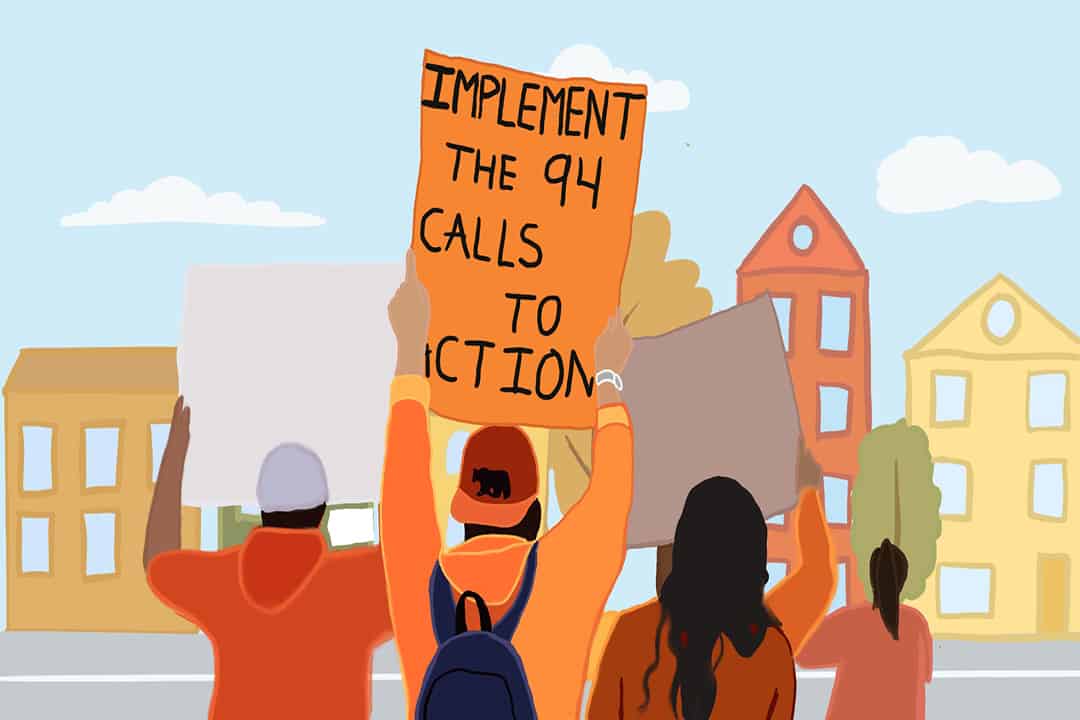In 2015, the Truth and Reconciliation Commission of Canada (TRC) delivered 94 Calls to Action to the Canadian government in order to further reconciliation between Canadians and Indigenous Peoples. The TRC was established as part of the Indian Residential Schools Settlement Agreement, which aimed to advance the reconciliation process between the Government of Canada and Indigenous Peoples who were once forcibly enrolled in residential schools in Canada.
The Calls to Action provide a list of deliverables to the Canadian government, aimed at helping to address the ongoing impacts of residential schools on survivors and their families through two broad realms of policy development and change-making: “Legacy” and “Reconciliation.” While the former focuses on redressing the generational scars the residential school system caused, the latter included policies to better the relationships between the federal and provincial governments of Canada and Indigenous Nations.
The TRC’s comprehensive framework ensured that the Calls to Action were advised by the testimonies of survivors and discussions by the Assembly of First Nations, Inuit representatives, the federal government, and church bodies. The TRC’s recommendations were initially delivered to former Prime Minister Stephen Harper’s government in June 2015, but he refused to commit to any of the Calls to Action in Parliament, stating that his government would instead wait for a “full report.” Justin Trudeau’s Liberal Party, on the other hand, offered “unwavering support” to the TRC’s findings and its suggestions.
Later that year, Trudeau was elected prime minister and began the process of implementing the Calls to Action, but nearly a decade later, he has failed to deliver much of what was promised. Although the Liberal Party claimed in December 2023 that its government has completely or partially fulfilled nearly 85 per cent of all the Calls to Action involving the federal government, independent investigative bodies have found this claim to be void and dubious.
Indigenous Watchdog, a non-profit organization committed to monitoring and tracking the progress of reconciliation efforts, including the Calls to Action, says that the federal government has completed or started no more than 66 per cent of the Calls to Action that it is responsible for. The organization has also pointed out that reports by CBC and the Yellowhead Institute, an Indigenous-led research and education centre, also corroborate many of its findings and show that the government’s claims of completed deliverables are overstated.
In fact, the Yellowhead Institute states in its 2023 Status Update on Reconciliation that, at the government’s current rate, it will take until 2081 for all of the TRC’s recommendations to be actualized. Although the process of reconciliation cannot be rushed, the institute’s timeline of completion highlights the government’s apathetic attitude toward the TRC’s findings — with none of the calls being completed last year.
The Yellowhead Institute and Indigenous Watchdog reports highlight the government’s misplaced motivations. The government has time and again used the TRC and the Calls to Action as concrete proof of their duty toward addressing Canada’s injustices against Indigenous Peoples. However, I believe that Trudeau’s failure to act upon or address the Calls to Action on an annual and transparent basis is a testament to the fact that the government’s dedication is largely performative.
The Calls to Action as they exist aren’t void of criticism either, as they seemingly fail to recognize colonialism as an ongoing facet of government policy and posit residential schools as the only issue to reconcile. Glen Sean Coulthard pointed out in his book, Red Skin, White Masks: Rejecting the Colonial Politics of Recognition, that the TRC’s recommendations as an orientation to reconciliation still remain colonial as they “remai[n] structurally committed to the dispossession of Indigenous [P]eoples of [their] lands and self-determining authority.” I see the government’s failure to respond to these critiques as further evidence of a lack of institutional dedication in pursuit of reconciliation.
Additionally, much like how the Harper government’s and the Trudeau opposition’s views on the Calls to Action in 2015 differed, it’ll be an interesting change of opinions when Trudeau finally makes way for the next prime minister — who, if polls such as the Abacus Data’s February 2024 survey are to be trusted, will be none other than the Conservative Party leader Pierre Poilievre. Although Poilievre has expressed his party’s support toward reconciliation, he is yet to elaborate on his specific thoughts on the Calls to Action.
My underlying expectation for the future of the Calls to Action isn’t that the next prime minister satisfies the calls at a faster per annum rate than their predecessor, but rather my concerns are toward the framework that the next prime minister will deem most efficient in pursuit of reconciliation. As far as policymaking goes, the Calls to Action, although flawed, provide a scaffolding which the government could improve upon. Even if the next prime minister put faith in an entirely different framework, I believe it would still mean progress at a similar rate — if any.
Reconciliation is an ongoing process and one that cannot be gauged by the completion of 94 deliverables. However, it is a process that demands the government to be actively involved, and the current situation with the Calls to Action paints a different picture: one that highlights the ambivalence of the Canadian government and their standing as an institution that believes more in talking than doing.
Nidhil Vohra is a fourth-year student at St. Michael’s College studying peace, conflict and justice and political science. He is an International Affairs columnist for The Varsity’s Comment section.



No comments to display.